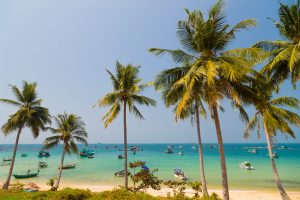Vietnam is one of the latest Southeast Asian countries to announce a tourism sandbox aimed at reviving the flow of inbound foreign visitors to resort destinations after the shellacking the travel industry has taken from COVID-19. It follows on the heels of Thailand’s well-publicized sandbox experiment in Phuket, and echoes the efforts of Indonesia, which has been pushing hard to re-open Bali. For many, this rush by governments to re-open tourist hotspots no matter what has been hard to understand.
All of these countries have been hard-hit by the surging Delta variant of the virus, and although vaccinations have been stepped up in recent months many places remain under lockdown. With high rates of infection and substantial segments of the populace still waiting to get vaccinated or struggling to cope with economic hardship, it seems rather tone deaf for governments to be prioritizing the re-opening of luxury resort destinations catering mainly to foreigners.
It is easy to chalk this up to government callousness, or make it an issue of class and privilege as the state seeks to bail out rich hotel owners and accommodate foreigners at the expense of locals. But I think it’s also important to view this tourism sandbox obsession in terms of the broader structure of the global financial system. And the bottom line is emerging markets often have an unhealthy dependence on tourism because they rely heavily on inflows of foreign exchange to prop up their current accounts.
Capital markets and investors expect emerging markets to run current account surpluses, maintain small fiscal deficits and accumulate healthy foreign exchange reserves. To do this, they need to keep foreign exchange flowing in, usually through exports of manufactured goods and services like tourism. And if they don’t, investors will punish them by driving up borrowing costs and selling off the currency which can drive down its value and potentially touch off a balance of payment crisis.
This balancing act is baked into the structure of global capital flows, and it traps medium-sized emerging markets in particular between a rock and a hard place. They become dependent on inflows of foreign currency, and if those flows should be disrupted it can set off systemic shocks. There is an element of agency here, of course, because government officials can make choices about how they want to design their economic systems, but a lot of it simply reflects structural constraints in today’s global political economy and there isn’t a whole lot that emerging markets can do about it.
You don’t see a more mature economy like Singapore pushing ahead with a tourism sandbox, because even though it is also a surplus country Singapore has more sophisticated and higher value-added ways of attracting foreign currency through its financial sector. But countries like Thailand and Vietnam don’t have that advantage, and so they have structured their economies mainly around the export of old-fashioned goods and services, creating a need to keep the foreign exchange flowing in. If not, capital markets will punish them.
And the pressure to drum up foreign exchange is mounting. As I wrote here, Thailand’s current account has already flipped into deficit in the face of withering service exports. Vietnam’s current account likewise narrowed from a $9.3 billion surplus in the third quarter of 2020, to just $350 million in the first quarter of 2021. This puts pressure on the government to bring in more foreign exchange however it can. And tourism, whether we like it or not, is one of the main channels for doing this because it gets foreigners to show up in your country and spend their own currencies.
So while there is an element of callousness in the way governments are rushing these tourism sandboxes into existence in the face of the virus, it is not merely incompetence or greed. It is also a function of deeper structural imbalances in the way capital is distributed around the word, the expectations that investors attach to it and the power they have to damage emerging economies if those expectations aren’t met. It is yet another subtle form of inequality baked into the global economy that usually goes unnoticed but has been laid bare due to the onset of this pandemic.

































